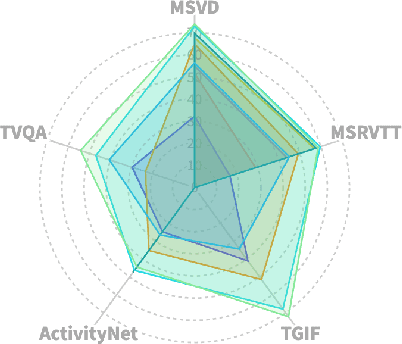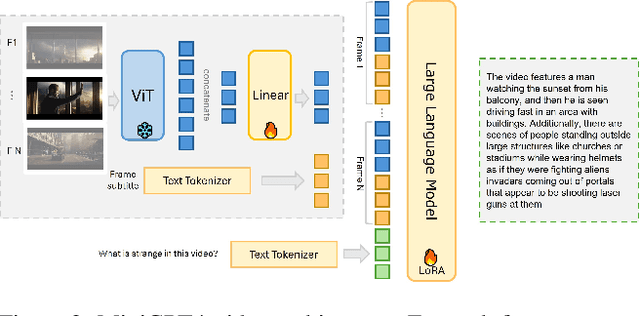Eslam Abdelrahman
Goldfish: Vision-Language Understanding of Arbitrarily Long Videos
Jul 17, 2024Abstract:Most current LLM-based models for video understanding can process videos within minutes. However, they struggle with lengthy videos due to challenges such as "noise and redundancy", as well as "memory and computation" constraints. In this paper, we present Goldfish, a methodology tailored for comprehending videos of arbitrary lengths. We also introduce the TVQA-long benchmark, specifically designed to evaluate models' capabilities in understanding long videos with questions in both vision and text content. Goldfish approaches these challenges with an efficient retrieval mechanism that initially gathers the top-k video clips relevant to the instruction before proceeding to provide the desired response. This design of the retrieval mechanism enables the Goldfish to efficiently process arbitrarily long video sequences, facilitating its application in contexts such as movies or television series. To facilitate the retrieval process, we developed MiniGPT4-Video that generates detailed descriptions for the video clips. In addressing the scarcity of benchmarks for long video evaluation, we adapted the TVQA short video benchmark for extended content analysis by aggregating questions from entire episodes, thereby shifting the evaluation from partial to full episode comprehension. We attained a 41.78% accuracy rate on the TVQA-long benchmark, surpassing previous methods by 14.94%. Our MiniGPT4-Video also shows exceptional performance in short video comprehension, exceeding existing state-of-the-art methods by 3.23%, 2.03%, 16.5% and 23.59% on the MSVD, MSRVTT, TGIF, and TVQA short video benchmarks, respectively. These results indicate that our models have significant improvements in both long and short-video understanding. Our models and code have been made publicly available at https://vision-cair.github.io/Goldfish_website/
InfiniBench: A Comprehensive Benchmark for Large Multimodal Models in Very Long Video Understanding
Jun 28, 2024Abstract:Understanding long videos, ranging from tens of minutes to several hours, presents unique challenges in video comprehension. Despite the increasing importance of long-form video content, existing benchmarks primarily focus on shorter clips. To address this gap, we introduce InfiniBench a comprehensive benchmark for very long video understanding which presents 1)The longest video duration, averaging 76.34 minutes; 2) The largest number of question-answer pairs, 108.2K; 3) Diversity in questions that examine nine different skills and include both multiple-choice questions and open-ended questions; 4) Humancentric, as the video sources come from movies and daily TV shows, with specific human-level question designs such as Movie Spoiler Questions that require critical thinking and comprehensive understanding. Using InfiniBench, we comprehensively evaluate existing Large MultiModality Models (LMMs) on each skill, including the commercial model Gemini 1.5 Flash and the open-source models. The evaluation shows significant challenges in our benchmark.Our results show that the best AI models such Gemini struggles to perform well with 42.72% average accuracy and 2.71 out of 5 average score. We hope this benchmark will stimulate the LMMs community towards long video and human-level understanding. Our benchmark can be accessed at https://vision-cair.github.io/InfiniBench/
MiniGPT4-Video: Advancing Multimodal LLMs for Video Understanding with Interleaved Visual-Textual Tokens
Apr 04, 2024



Abstract:This paper introduces MiniGPT4-Video, a multimodal Large Language Model (LLM) designed specifically for video understanding. The model is capable of processing both temporal visual and textual data, making it adept at understanding the complexities of videos. Building upon the success of MiniGPT-v2, which excelled in translating visual features into the LLM space for single images and achieved impressive results on various image-text benchmarks, this paper extends the model's capabilities to process a sequence of frames, enabling it to comprehend videos. MiniGPT4-video does not only consider visual content but also incorporates textual conversations, allowing the model to effectively answer queries involving both visual and text components. The proposed model outperforms existing state-of-the-art methods, registering gains of 4.22%, 1.13%, 20.82%, and 13.1% on the MSVD, MSRVTT, TGIF, and TVQA benchmarks respectively. Our models and code have been made publicly available here https://vision-cair.github.io/MiniGPT4-video/
 Add to Chrome
Add to Chrome Add to Firefox
Add to Firefox Add to Edge
Add to Edge